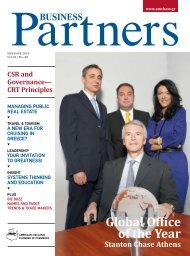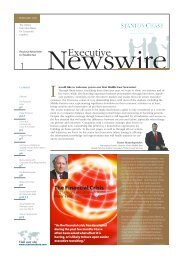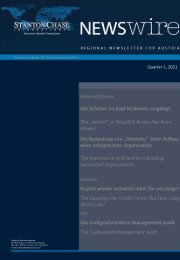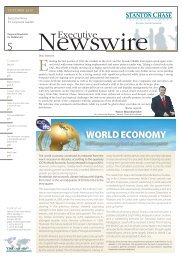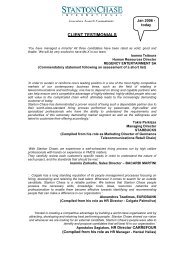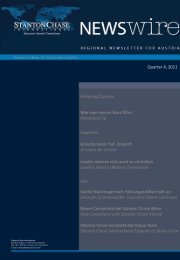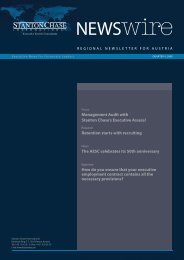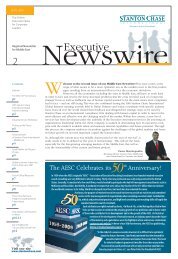Middle East - Stanton Chase International
Middle East - Stanton Chase International
Middle East - Stanton Chase International
Create successful ePaper yourself
Turn your PDF publications into a flip-book with our unique Google optimized e-Paper software.
MAY 2010<br />
p3<br />
STANTON CHASE INTERNATIONAL<br />
<strong>Middle</strong> <strong>East</strong><br />
Profile and Mobility Trends<br />
of the Senior Executives in<br />
<strong>Middle</strong> <strong>East</strong><br />
May 2010<br />
On the break of the new era, characterized by many as “the new<br />
normal”, while having “survived” through the turmoil of the 2009<br />
deep recession, the Senior Executives in the <strong>Middle</strong> <strong>East</strong> begin to<br />
develop the balances and requirements that will allow them to<br />
further advance their career within this volatile environment.<br />
Though last year was mostly the “year of survival”, this year seems to<br />
head towards “development”. The issues and priorities questioned<br />
during 2009 and the values that seemed to become weaker in view of the<br />
depression are now put into scrutiny and urge senior executives to decide<br />
on the next steps in their career. Even from last year, top executives were<br />
beginning to regard <strong>Middle</strong> <strong>East</strong>, and mainly the GCC region, as a market<br />
for long term business development, as opposed to the rather more<br />
opportunistic short-term plans of the past. As such, they had started<br />
questioning quality in general and C-level decision making, raising issues<br />
of personal and career development, shortage in leadership talent as well<br />
as retention of talent in the current GCC environment.<br />
Given the fact that, despite the strong blow and the challenges, the<br />
regional economies emerged as “winners” - compared to other parts of<br />
the world - and still proceed with the regional long-term development<br />
plans, the senior executives seem to feel safe enough to start exploring<br />
professional opportunities, often expressing a dissatisfaction regarding<br />
the managerial decisions and overall culture that emerged through the<br />
2009’s survival policy. As a consequence, development of technical<br />
skills as well as of the personal business network, along with the<br />
need for professional advise and mentoring gain in importance, in<br />
order to allow the executives on one hand to make the next step and, on<br />
the other hand, to face the increasing competition from the still unstable<br />
economies around the world.<br />
Another point that prevails from the above is the need of the companies<br />
as employers to prove their ability to develop an environment that lives<br />
up to the expectations of today’s senior executives, supporting their<br />
Panos Manolopoulos<br />
Exclusive<br />
Newswire<br />
personal and professional growth, while increasing their retention rates.<br />
Regardless of whether the executives are ex-patriats or nationals (as the<br />
last percentage tends to increase, given the on-going nationalization<br />
programs of the <strong>Middle</strong> <strong>East</strong>ern countries), the complexity of their<br />
requirements, combined with the complexity of what is required by<br />
them, shows the way to a era of new leadership that should not be<br />
underestimated. Even though there is a false perception that talent is “in<br />
abundance” due to the recession, the truth is that, despite the increased<br />
competition, competent senior human talent is always scarce to find,<br />
and it will keep being even more difficult. Retention, as well as careful<br />
succession planning, is to become among the top priorities of the<br />
companies that, besides promoting their brand to the clients, would<br />
need to promote their brand to the executive / employee market as<br />
well.<br />
<strong>Stanton</strong> <strong>Chase</strong> – <strong>Middle</strong> <strong>East</strong> conducted this CEO Census in order<br />
to compile the profile of Senior Executives in the <strong>Middle</strong> <strong>East</strong>ern<br />
region today, analyze the trends in this challenging market,<br />
and comprehend the opportunities and threats in their career<br />
development.<br />
We would like to thank the 638 top executives from the <strong>Middle</strong> <strong>East</strong>ern<br />
market (mainly from the GCC, but also the Levant and North-<strong>East</strong> Africa)<br />
who responded. It is the second year <strong>Stanton</strong> <strong>Chase</strong> – <strong>Middle</strong> <strong>East</strong> has run<br />
this comprehensive survey, with the aim to depict preliminary long-term<br />
trends and characteristics over time, starting with the comparison from<br />
last year’s results. These tendencies will be much more clearly outlined<br />
in the future, based on the following years’ respective surveys. This series<br />
of surveys demonstrate <strong>Stanton</strong> <strong>Chase</strong>’s commitment to understanding<br />
business leaders’ views shaping the Senior Executives’ career in the region<br />
– and sharing this knowledge with the world at large.<br />
Dr Panos Manolopoulos is Vice Chairman Regions of<br />
<strong>Stanton</strong> <strong>Chase</strong> <strong>International</strong> & Managing Partner <strong>Middle</strong> <strong>East</strong>.



